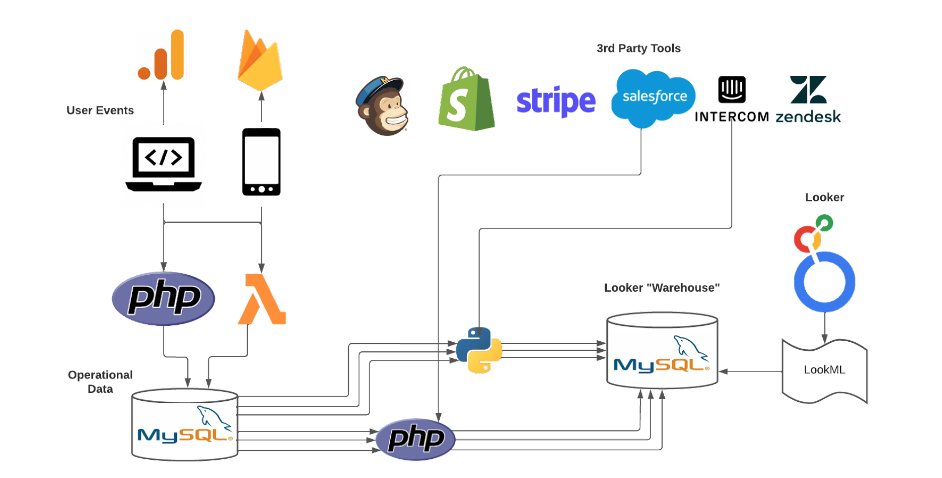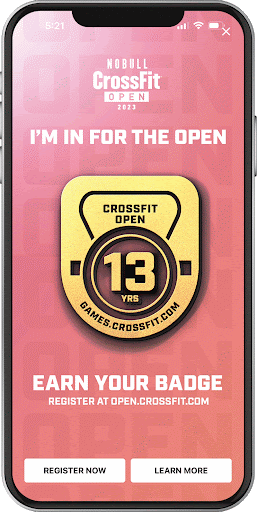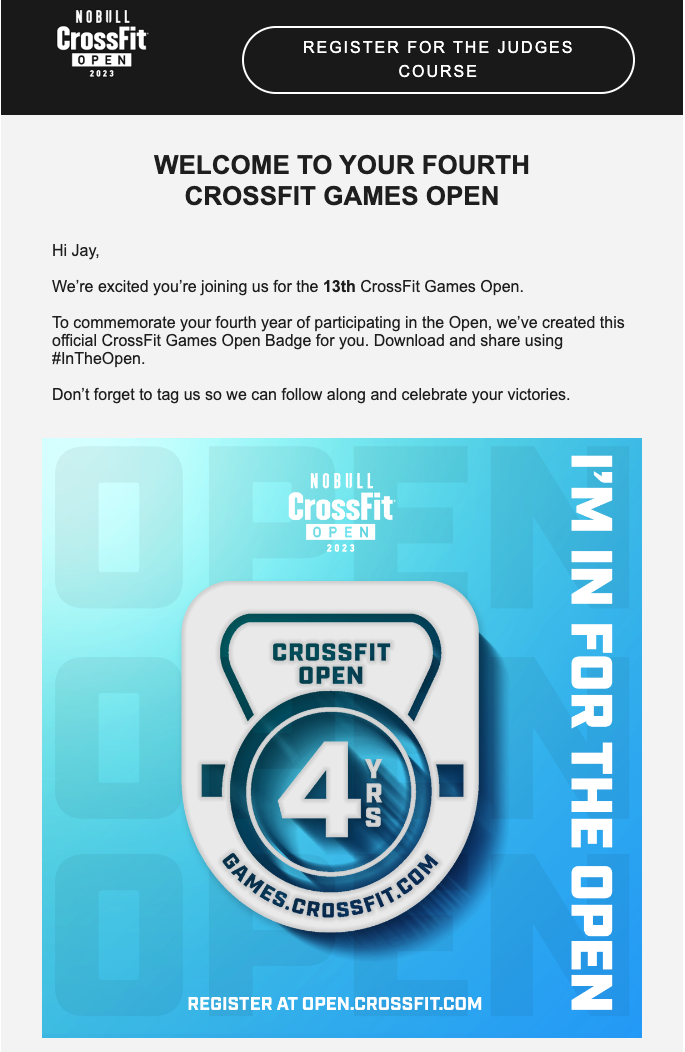Table of Contents
- Building a modern data infrastructure to solve for inconsistent, duplicative data management
- Consolidating Affiliates, Education and Sport business models to improve cross-functional collaboration and efficiency
- Analyzing complex data to better understand customers and recommend relevant information
- Using precise personalization in email to increase customer engagement
“A lot of people associate CrossFit with tough workouts. But we have so much more to offer,” said Jay Meyering, CrossFit’s Senior Software Development Manager. With three distinct business lines, Gym Affiliates, Education and Sport, CrossFit provides a variety of wellness solutions to athletes around the world.
However, Jay and his team realized that many people assume CrossFit is strictly meant for intense fitness professionals. Most people don’t know that CrossFit is an inclusive community providing health, performance and wellness offerings across its three business lines for all types of athletes – regardless of fitness level, age or location.
But, the team at headquarters did not have a direct connection with the people in CrossFit gyms, doing the workouts, tracking memberships and leading education. CrossFit HQ couldn't connect with customers directly because the local gyms owned those relationships, which led to inconsistent experiences across the other CrossFit platforms. “We have our blindspots,” explains Jay, “we are trying to reach people across the community but we don't have that information readily available."
To overcome this hurdle, Jay and his team had to identify strategies to communicate directly with customers, reach a larger audience and demonstrate the value of CrossFit’s entire platform. They aim to ‘Share the magic of CrossFit,’ by educating users with the latest fitness content and media, driving new memberships, increasing active coaches, and registering users for virtual and live events.
Jay and the team at HQ needed to build direct connections with prospective users and current CrossFit customers to drive a more consistent customer experience across Affiliates, Education and Sport platforms. Fueled by this ambition, Jay and his team set out to align the organization’s understanding of CrossFit end users and accelerate community growth.
CrossFit leaned in to focus on its athletes. Jay’s team led the charge to streamline access to customer information so that team members at CrossFit can connect more personally with customers. “At the beginning, we didn't have the right tools to get the job done,” explained Jay. CrossFit needed to build a reimagined, long term data architecture with consolidated data from multiple business units, the ability to reach customers and scale as the business grew. Jay concluded, “this is exactly where Segment came in.”
Building a modern data infrastructure to solve for inconsistent, duplicative data management
One of the biggest challenges Jay faced was understanding customers across CrossFit’s three distinct business lines.“We have to reach and communicate with these people in unique ways. Each of these distinct audiences respond differently to CrossFit,” said Jay. With that in mind, the new data-driven approach would prove difficult. Like many organizations, data collection, cleansing and activation across product and service lines was not always a top priority at CrossFit.

Before Segment, CrossFit’s data was messy and inconsistent. It was difficult to upend data and table syncing was ineffectively done through homegrown script sync. In Jay’s words, “the three business pillars, Affiliates, Sport and Education, were not communicating with each other or sharing data, and our software stack reflected that. There was a lot of duplication and inconsistency.” Data was tracked from front-end tools like Google Analytics, tracked in individual tools and systems like Firebase (used for its mobile app), and shared in .csv format to activate in support tools like Intercom and Zendesk. There was no sharing of user information between the systems.
This resulted in data silos, disjointed customer profiles, inefficient processes and duplicative work. Since CrossFit’s HQ team couldn’t interact directly with members, they didn't have a good sense of the user journey, engagement trends or customer touchpoints. “At the core, we wanted to understand our users. That was very challenging due to the data silos internally, lack of customer visibility externally and the inefficient technical systems we had in place,” said Jay.
Jay and his team aspired to become more efficient and streamlined — transforming CrossFit into a data-focused organization would benefit every team from Marketing, to Operations to Technology and Data.
Starting with Technology and Data, its teams hoped to consolidate and clean user data across the three business pillars, while adhering to consumer privacy and security compliance requirements. Business Operations strived to more easily and efficiently launch new tools and integrations while Analytics wanted basic answers to customer acquisition and retention questions. Lastly, Marketing aimed to more effectively reach and communicate with customers by leveraging unique, precise personalization in its communications. Before CrossFit’s organization could leverage the power of data, Jay and his team had to build the architecture that would unlock all of these capabilities.
Consolidating Affiliates, Education and Sport business models to improve cross-functional collaboration and efficiency
With Twilio Segment, CrossFit could combat data inconsistencies and the lack of customer visibility that CrossFit experienced. “Segment was the first step towards our new data stack that ended up redefining how we manage our data at CrossFit and how we are leveraging our tools to get things done. Now, our data and teams are cohesive and connected, we can make data driven decisions and reach our customers effectively. This is what Crossfit looks like today with Segment, and I just love it,” said Jay.
Messy, inconsistent, disconnected data was a thing of the past. With Segment, CrossFit could think about their long term data architecture and build a modern data foundation. With Segment Connections, CrossFit pulls information from third party tools, like Stripe, Braze and Salesforce, syncs that data with Segment and sends to downstream tools and their data warehouse, Snowflake, as well.
From there, CrossFit utilizes Segment Unify to gain a complete understanding of customers by tracking data across various web and mobile platforms (Gym Affiliates, Education and Sport applications) and combining that information to build identity resolved customer profiles. Using Segment Reverse ETL, CrossFit then sync’s those customer profiles to and pushes user information into Salesforce ServiceCloud (for support) and Braze (for marketing).
“When I heard that Reverse ETL was in private beta at Segment, I immediately thought, ‘this is exactly what we need!” So, we started using Reverse ETL which now completely enables CrossFit teams with useful, clean, trusted, reliable data; It puts the data into their hands and into the tools they are using everyday. Segment’s Reverse ETL is the answer and exactly what we need,” said Jay.
Now, CrossFit has centralized data from the different business lines and has built a customer source of truth, with the most accurate data from a variety of connected sources. Not only does their team have a deeper understanding of each customer, but they are also able to consolidate tools and reduce the cost of using and maintaining duplicative resources.
Analyzing complex data to better understand customers and recommend relevant information
CrossFit now has a more complete view of its customers, tracking operational data based on user interactions across their platforms like subscribing to online courses and signing up for the CrossFit Open. They use this information to identify customers that might be interested in other CrossFit offerings. However, it was not always that easy.

Before Segment, “it was a big mess, it was hard to answer basic questions, it took a lot of maintenance and made our lives pretty difficult,” said Jay. For example, basic analytics were much more difficult than they needed to be. To better target across platforms, the CrossFit team wanted to answer the question, “In the US, how many athletes have competed in the Open and taken an online course?”
Parts of this were easy, others were not. To start, CrossFit had a Competitions database, tracking athletes that signed up for previous events like the Open – that was the easy part. From there, just under 10% of their database had locations attached to user records, which made geography difficult to understand. They attempted to pull location information from their Affiliates platform and other sources like 3rd party tools or invoice records. Additionally, it was difficult to understand which online courses and live events customers engaged with, because CrossFit used multiple learning management solutions. To compile all of this information, CrossFit downloaded CSV files from each of these disparate sources, loaded them into excel and used a v-lookup to analyze customer data. This whole process would take hours, or even days, to complete, which was a poor use of time and Engineering resources.
With Twilio Segment, CrossFit has a better picture of the data landscape, users that are involved and how people are interacting with the various platforms and offerings across Affiliates, Education and Sport. They are feeding data back into source tools so that teams have the capability to understand CrossFit customers, without support from Engineering. Now, it only takes minutes to answer the question about ‘US athletes that compete in the Open’, using Sigma (a cloud native analytics platform). Going one step further, the CrossFit team can even activate this information to target customers with specific courses or offers, incentivizing athletes to utilize other offerings across the CrossFit platform. This resulted in a 30% increase in efficiency by minimizing Engineering resources and 10-15 hours saved per campaign (on average) to automate marketing activations.
Using precise personalization in email to increase customer engagement
With an understanding of who is coming to the CrossFit site and interacting with each of the various business offerings, Jay has visibility into who the various users are and the content that resonates with each audience. With this data readily available, Marketing teams have built more effective communications and campaigns – and it is only just the beginning.
The CrossFit Open, the company's virtual, world-wide competition, occurs annually. Every year, users can register and participate in various workouts throughout the three week competition. Tracking registrations throughout the year, and consolidating information from previous years competition, is no longer a challenge with the help of Segment.
CrossFit tracks events throughout the registration funnel to understand who is joining, falling out, engaging and submitting scores. This data feeds into downstream tools where CrossFit’s Marketing team runs email campaigns. To increase user engagement, an email is sent to CrossFit users upon “registration,” triggering a “thank you” gift card and encouraging them to take the next step to complete a workout. And, to encourage people to re-register the next year for the CrossFit Open, the Marketing Team built a campaign with personalized badges to add to their collection, which resulted in a 24% increase in registration click rates.

“We are just scratching the surface, but seeing these campaigns come together with powerful customer data flowing from Segment is really exciting,” said Jay.
About CrossFit
CrossFit is the world’s leading platform for improving health and performance. In the 20 years since its founding, CrossFit has grown from a garage gym in Santa Cruz, California, into the world’s most effective program for improving health and performance through nutrition and exercise. CrossFit is the world’s leading provider of accredited performance-based training courses and certifications and has more than 125,000 credentialed coaches across the world. The program can be modified to welcome people of all ages and abilities and millions of people have already experienced CrossFit’s transformational benefits in more than 13,000 affiliated gyms across 158 countries. CrossFit also directs the CrossFit Games season, beginning with the annual CrossFit Open, through which athletes at every level compete worldwide, and culminating in the CrossFit Games, where top athletes compete for the title of Fittest on Earth®. Learn more about CrossFit
Find a CrossFit affiliate near you
Find CrossFit courses near you
Learn more about the CrossFit Games
Interested in hearing more about how Segment can help you?
Connect with the team to learn how 25,000+ companies use Segment's extensible, scalable platform to turn customer data into revenue-generating experiences.